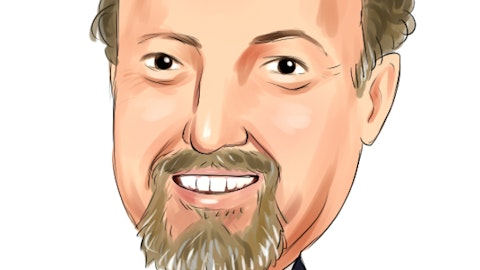Operator: Your next question comes from the line of Alex Scott from Goldman Sachs. Your line is open.
Alex Scott: Hey. Good morning. First one I had is actually a follow-up on the last question. On the capital front, when you think through how strong the margins are, as you pointed out, and price adequacy across a lot of your business in a pretty strong place balanced with some of the comments you are making about the forward-looking casualty markets and so forth. How does that make you feel about your capital and your willingness to deploy into organic business at the moment, when we think about strong starting point, and the comments you have made about the next year in casualty potentially?
Evan Greenberg: Look, we have plenty of capital and firepower to support organic growth on our appetite, and I already said it around property, and it extends to any line of business. If we like the terms and the pricing on a risk-adjusted basis, we will grow our exposure period. Is that something to say. Volatility, if I am paid to take it.
Alex Scott: Understood. Second question was also a growth question, but on the life insurance business. Just wanted to see if you could help us think through now that you have completed the Cigna acquisition and you get into some of the integration and so forth, what does that look like and thinking out over the next year or 2 years in terms of being a growth engine for the company?
Evan Greenberg: Yes. I think it is both in earnings and it is both a source of earnings growth, and it is a source of revenue growth, particularly in Asia. And it is in both the risk ends of life insurance, which think about more accident and health oriented, which I have gone into detail about that. As well as protection, more traditional protection and savings business, think about it through a variety of distribution channels, agency direct marketing, telephone-based and the fast emergence of digital channels. Think about it in partnership with our non-life business, which are very active that way and that’s a competitive advantage for Chubb in life and Asia’s. Our integrated capability and distribution and product among life and non-life together to the same customers.
Think about the growing consumer base. Middle income, in particular, and then high net worth, particularly in certain territories, China and Hong Kong based and the middle income from Korea to Thailand, Vietnam, Indonesia and think about this is the most dynamic region in the world when you think about long-term wealth creation. And I think the next 1 year or 2 years, sure, look good, but that’s not what’s on my mind. It’s the next 5 years to 10 years and how it’s now 20% of our business, Asia, and the majority of it is consumer, not commercial. And when I think across all lines, including the life and that business, to me, will represent a greater percentage of Chubb. And over time, you can’t measure it just quarter-to-quarter. But over a period of time, when you look at it, we will out €“ its growth trajectory will outpace the rest of the company.
Alex Scott: Got it. Very helpful. Thank you.
Evan Greenberg: You’re welcome.
Operator: Your next question comes from the line of Mike Zaremski from BMO. Your line is open.
Mike Zaremski: Hey. Good morning. First question is on the helpful paid-to-incurred ratio comments you provided us on the call, and obviously, we get them from the Qs and Ks too. But I was looking back, I can see that the underlying paid-to-incurred the items you called out has increased to 85%, up year-over-year from 81%. But if I look kind of back at pre-COVID years, pre, I guess substantial rate increases in terms of conditions changes, too, obviously, it was running in the low-90s. So, just curious at a high level, if you feel this ratio is kind of running kind of a little better than you expected? And maybe that’s for a good reason given the substantial changes in the marketplace over the last few years.
Evan Greenberg: Well, I think it tells you a few things. We have grown our exposure a lot. And your first incurred losses and we are in a fast, we have been in a faster growth trajectory. So, when you conceptualize, we have grown more quickly exposure, incurred losses come and grow at a certain pace before the paids come through. So, on one hand, you have that. And then on the other hand, you have the strength and maybe it speaks ultimately to the strength of our reserves. And let’s just wait and see over time. It’s nothing, but good news.
Mike Zaremski: Thanks. That’s helpful. Follow-up is just I am curious if you could provide us with a kind of update on strategic priorities as regards to North America commercial kind of moving down market into small, medium-sized employer competitive sandbox. Is that still an inorganic strategic priority? And is M&A also on the table there? Thanks.
Evan Greenberg: I will try to have M&A on the table. No, there is no M&A. I am looking at a table that is empty at the moment. It’s organic growth and we are endeavoring along and it is very digital and modern centric. And in concert with our middle market and lower middle market business. And the two of those, while the small commercial itself gets modernized into a digital enterprise, it is a consistent and very intense strategy in terms of management focus, resource and attention. I am looking at John Lupica, I am looking at John Keogh and we have the most senior executives with their eyes and Julie Dillman, who runs all of our IT and Ops and drives our transformation. From that end, we have got so much executive talent just focused and committed that this is an important future business to Chubb. And it is just €“ it’s consistent and it’s €“ you grind it out, yard-by-yard.
Mike Zaremski: Thank you.
Operator: And there are no further questions at this time. Ms. Karen Beyer, I will turn the call back over to you for some closing remarks.
Karen Beyer: Thank you everyone for joining us today. And if you have any questions, follow-up questions, we will be around to take your call. Enjoy the day. Thanks.
Operator: This concludes today’s conference call. Thank you for your participation. You may now disconnect.
Follow Chubb Corp (Old Insider Filings) (NYSE:CB)
Follow Chubb Corp (Old Insider Filings) (NYSE:CB)
Receive real-time insider trading and news alerts




